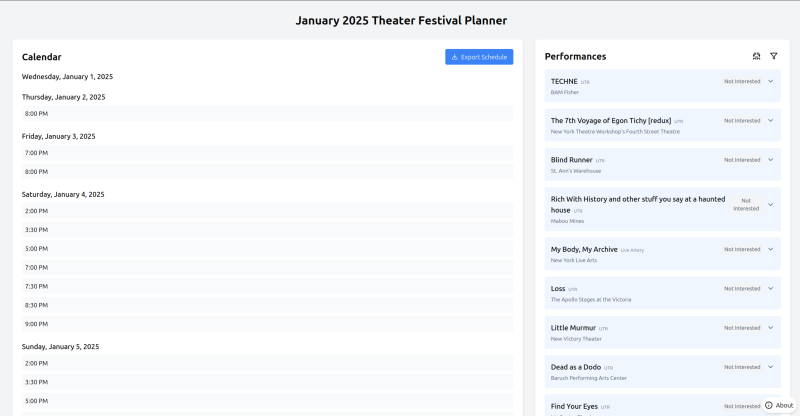
tldr: I created a website to help figure out when to see shows in the 2025 Under the Radar, Exponential, PROTOTYPE, and LiveArtery shows using an AI platform called Bolt.
Background
Every January in New York City there are a bunch of festivals with incredible experimental theater: Under the Radar, PROTOTYPE, The Exponential Festival (<3) to name a few. There's even a whole website dedicated to this: JanArtsNYC!
Deciding what to see is not a problem for me. Figuring out how to fit in the 10+ shows I want to see is the challenge. Each festival puts out their own schedule, but they are not collated. Even if there was some kind of single-page omnibus listing of every performance, it is still a pain to figure out how to fit in each one.
I thought I could solve this problem last year with ~technology~ so I put together a super simple app to do so:
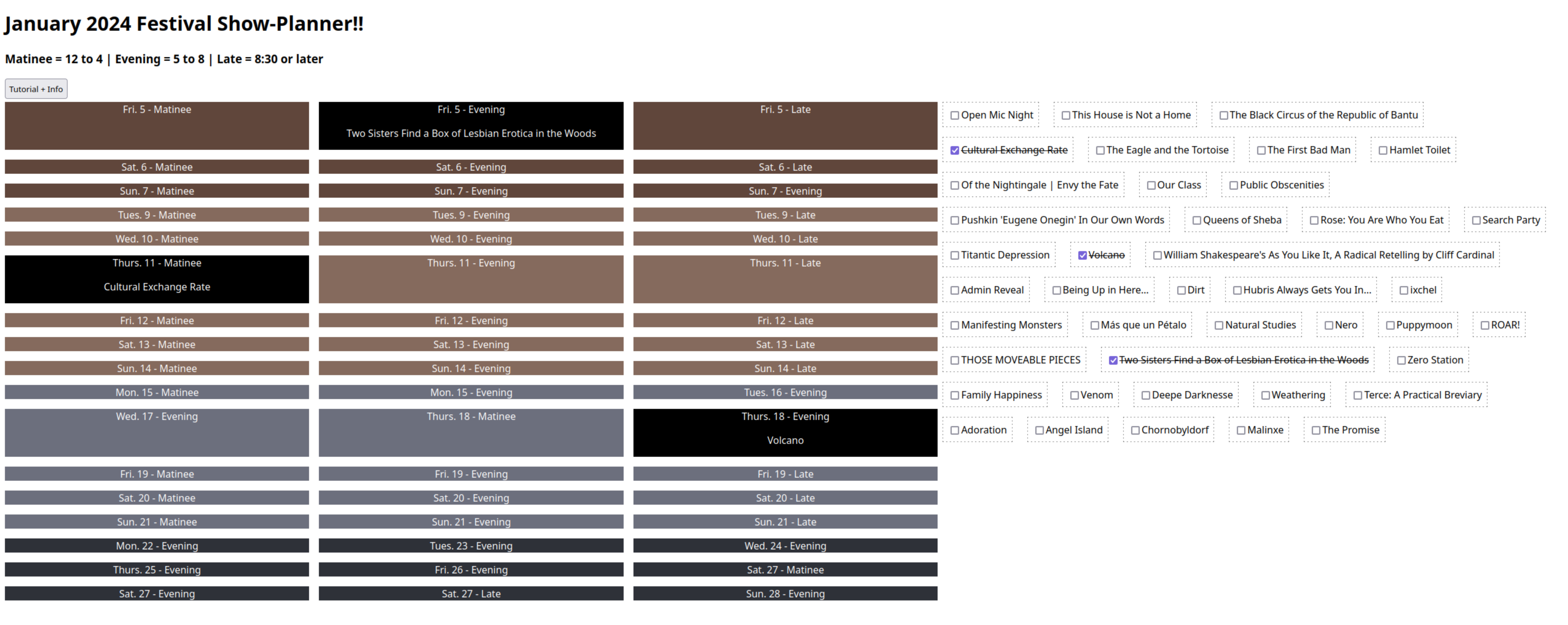
You simple added a checkbox to the shows you wanted to see, and when you started to drag a show, all of times it had performances would change colors.
I made the choice to sort performances into three slots: matinee, evening, and late. Possibly you could attend three shows in a day, but I'm sure more were feasible in some cases. Built off the React DnD package, I created (17x3) 51 time slots, and manually configured each slot to have the relevant shows. It was super time consuming, but it ultimately worked (I think).
Getting with the times
A co-worker at my day job has been mentoring me as I've worked towards becoming a front-end web developer. He suggested I use some of the new Artificial Intelligence tools to help with coding, to search for solutions same way I (and every other coder) rely on StackOverflow to get answers. From a LLM (Large Language Model) running on a computer literally in his house he built entire websites and has a chat interface right on his phone.
I have both been surprised and delighted by AI tools, but feel a lot of frustration about the hype. More on that later.
There are two challenges to tackle with this project and I wanted to see how AI could assist with either:
- Designing a good website
- Importing festival schedules
Just to start...just to see what would happen...I went to Duck Duck Go's AI chat since it is free to try, requires no login, and allegedly respects your privacy. I just described what I needed. What it responded with surprised me:
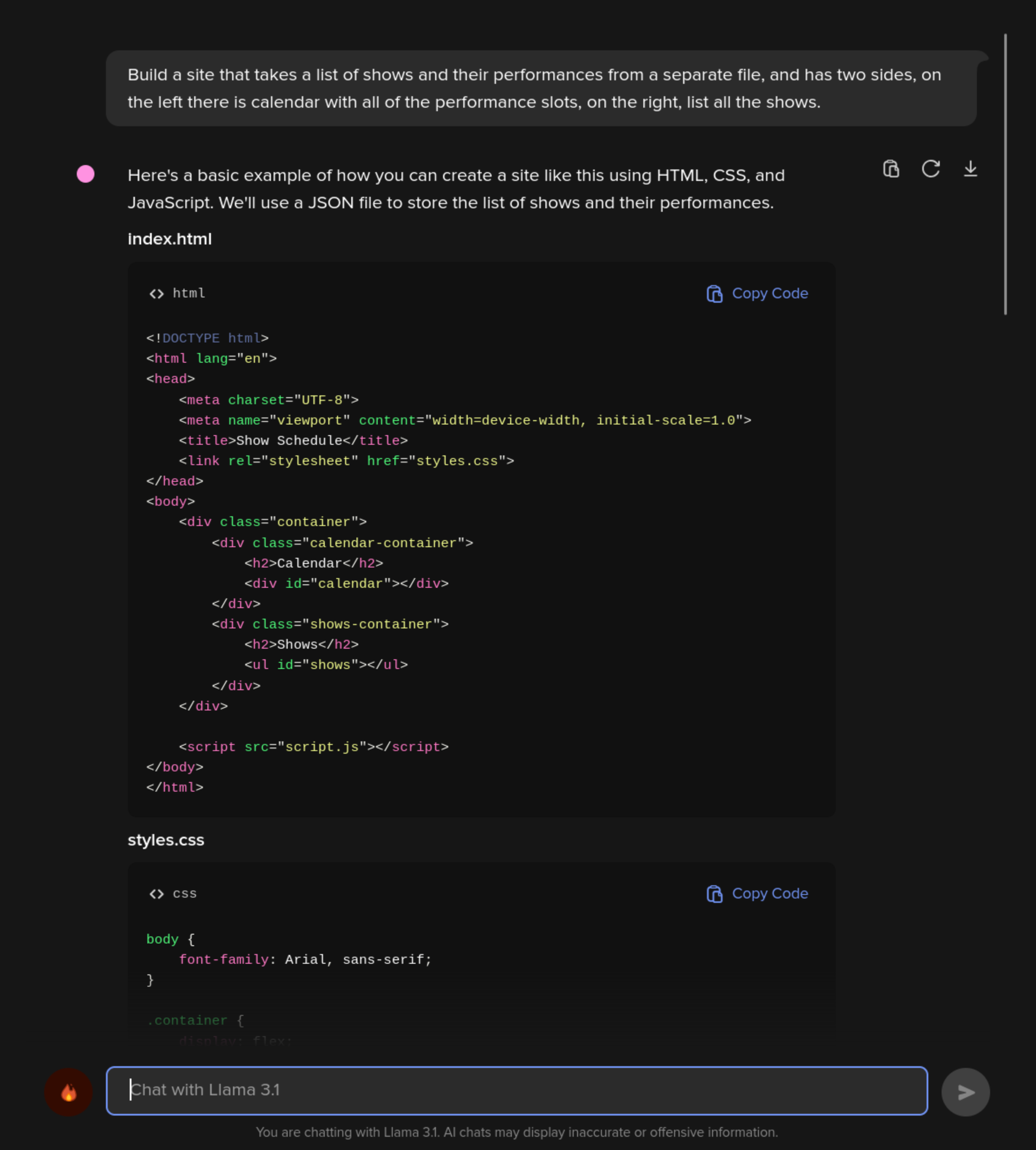
This was decent enough boilerplate code!
I starting by coping and pasting the code into a project on Glitch (a site that makes writing, previewing, and deploying websites FUN!) and then asking the chatbot for small changes. Then I would copy and paste the new code. Going back and forth for a bit I ended up with this:
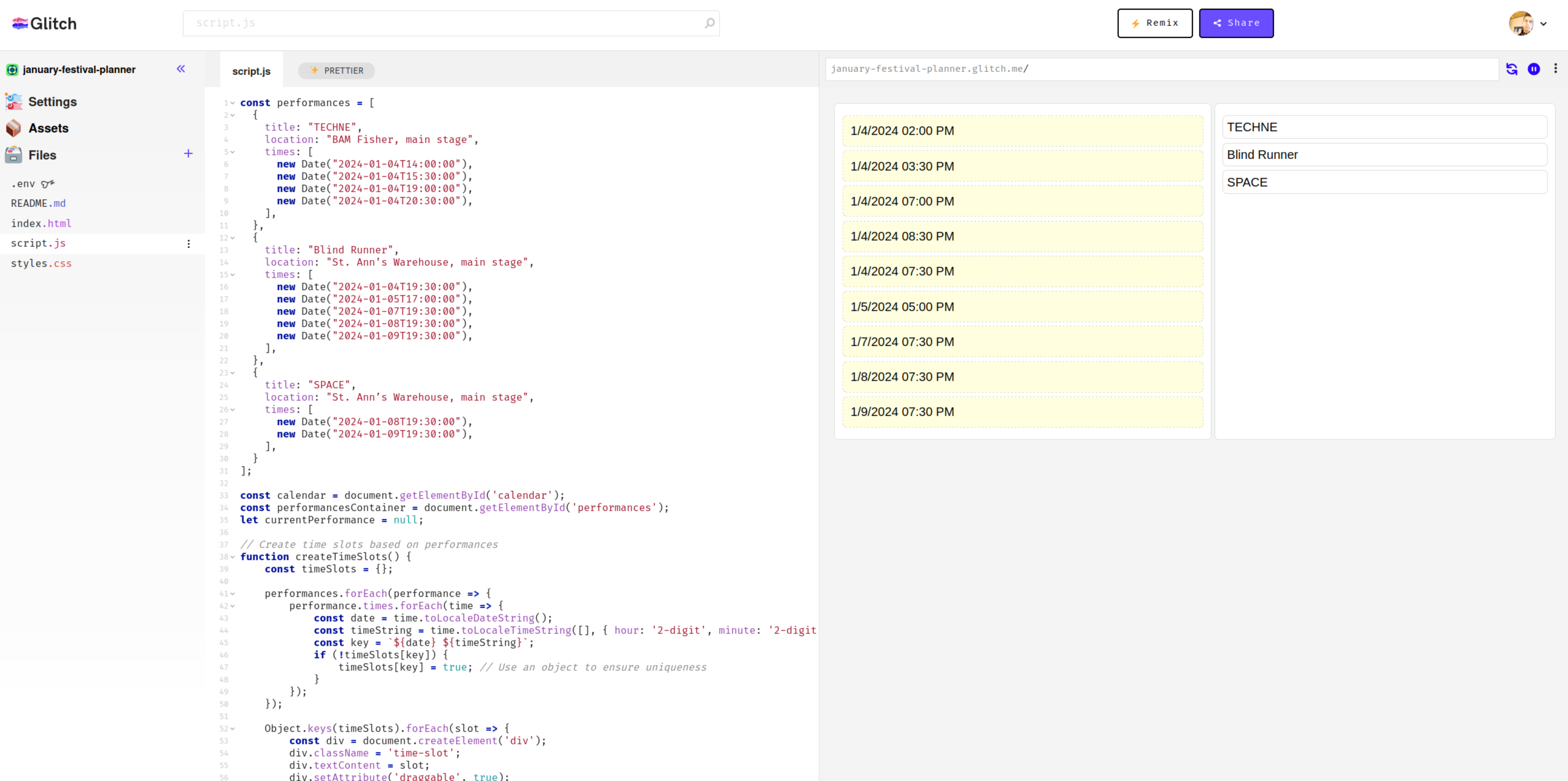
Nothing fancy, but I felt like I had a site that was a small improvement on last year's. This site was generating time slots from show data, rather than manually putting this data together. And the code was simple enough (+ annotated) so that it made sense to me! And this was in vanilla JavaScript, which is really all the rage these days. In conclusion, yes AI could help me with task #1.
But with problem #2, how do I get show data in? On the Under the Radar website thankfully was a single page listing every single performance. And Nic at Exponential created one too! So I literally highlighted the entire page and copied it into the chatbox asking "can you format this in the pattern I request"?
I hit a wall with DuckDuckGo, the JavaScript would randomly cut off in the middle:
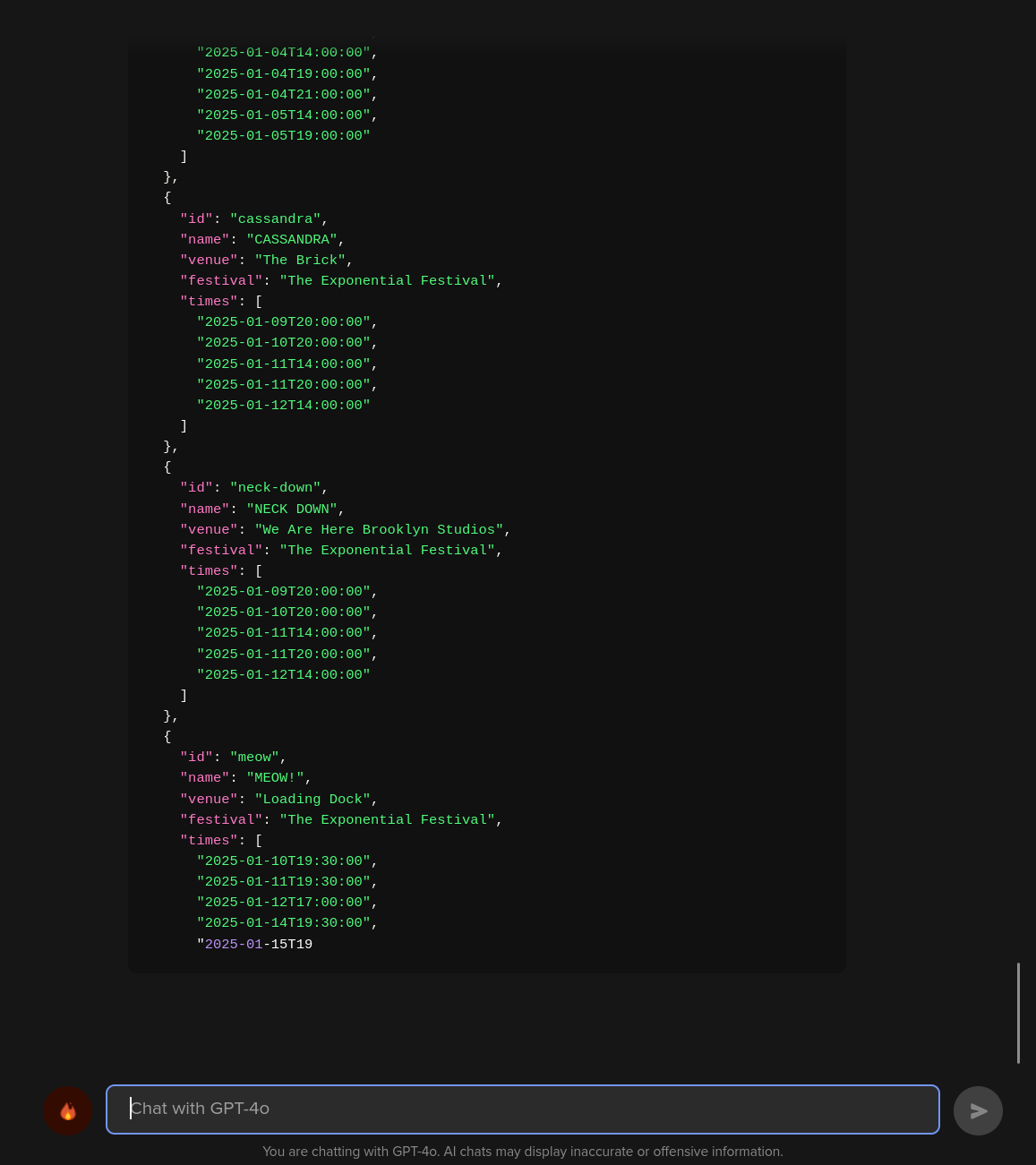
I would ask for a new file and receive the same thing, even when I tried different models (GPT-4o, Llama, etc). It felt like that scene in The Good Place when Janet keeps giving Michael a cactus.
Even if I split the work into chunks, eventually my conversation with the AI would reach a limit in DuckDuckGo, and I would have to restart.
There's got to be a better way
When I showed what I was had up to this point, my mentor he told me about a site called Bolt. It's an AI designed for website creation, offering a chat and then handling all aspects of bringing your site into existence. This isn't the only platform like this, but it's the only one I've tried!
Giving the same kind of prompts, I ended up with a slightly nicer looking site:

Bolt built the site with React and Typescript (which I know, and maybe could have asked for it to not do) which makes the site a lot more complex in every sense. The code isn't annotated the same way as what I got from DuckDuckGo's AIs, but the site isn't that complicated.
I had some "features" in my head that would make the site more useful like adding a dropdown to filter by festival. And a button to export your assigned shows to an .ics file that you can import into your calendar! For each of these ideas, I just described the feature and Bolt added it. That was kinda really cool:
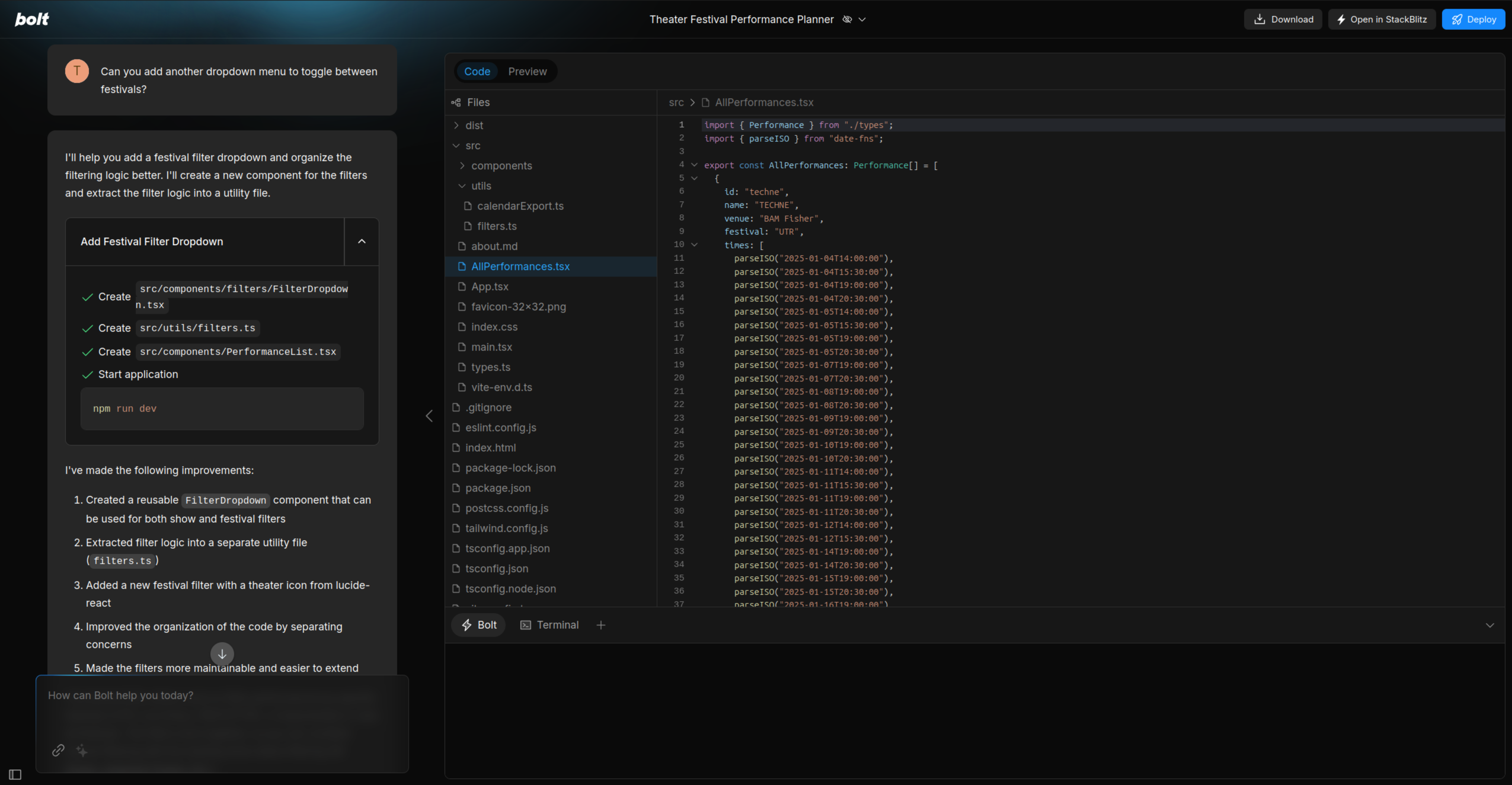
Bolt also had a file import function, so I ended up saving the Under the Radar's schedule page as an HTML document and just importing it, which worked a little better than copy/pasting the text.
Limitations
I did manually spot-check all of the performance times, since I found that there were too many inaccuracies. Problem #2 wasn't exactly solved, but using these tools did help a little.
I do not know how the sausage gets made here. If there is a bug, or a feature I wanted to add myself, it would take me awhile to familiarize myself with the code if I even could.
Like anything, Bolt has a limited free tier, so after a little bit of work I would have to wait for the next day when my tokens would refresh.
What does this all mean
These AI tools are useful for me, and probably you! For coding, I think this is useful for creating small helper functions. If I was making something serious, something for festivals around the world (the Edinburgh Fringe, Julidans, Teatro a mil, etc) to use, I would build most of the site myself, but use AI for specific, testable components like "take the list of shows and generate time slots".
I don't think it means that software developers are going to become obsolete or in any way replaceable. I think individuals are going to be able to work a little better, should they choose to use these tools. An understanding of how everything works will always be essential for debugging, and making things happen that a computer can't figure out, or someone can't figure out how to ask correctly.
There's a lot of hand-wringing about the environmental impact: the energy used by AI servers, the water to cool them. These concerns, like everything I do in my life, make me want to be cautious of my resource use. Right now, it feels like companies want us to be unaware of what is the true cost. Like low-interest venture capital money turning the taxi industry into the Uber/Lyft duopoly, I fear that companies will take attention and power, then find how to maximize profits at the loss to everyone. Such is the goal of capitalism.